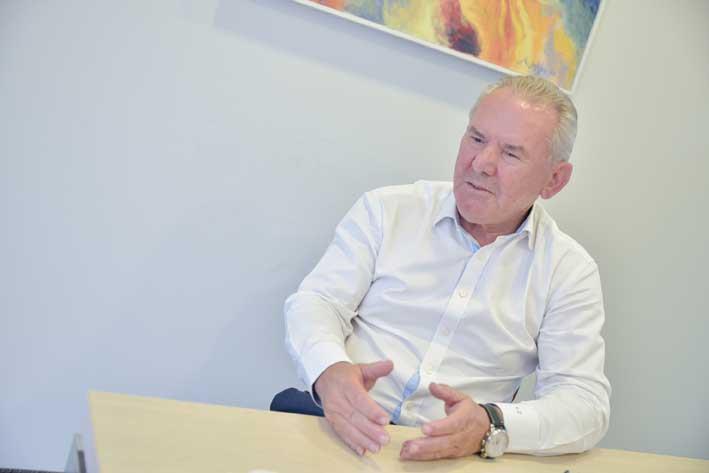It will likely take around two to three years for the country to reach the economic levels seen in 2019, President of the Chamber of Commerce, Enterprise and Industry David Xuereb told The Malta Independent.
Xuereb, along with the CEO of the Chamber of SMEs Abigail Mamo and the President of the Malta Hotels and Restaurants Association Tony Zahra, were asked about the Prime Minister’s statement, that he wants to see the country return to business as usual by May, as well as for their predictions for 2021.
“I believe that what he (Prime Minister Robert Abela) was trying to say was that, if we have herd immunity in May, then we would be able to resume normality such as by removing our masks and returning to the usual way we used to interact with each other,” Xuereb said.
“This will enable business to restore itself over time without the barriers induced by the pandemic. I am sure that he does not believe that in May all the economic problems we have accumulated would clear up, as that is not realistic."
"The Malta Chamber’s assessment is that, soon after herd immunity is achieved, we would have ‘business-as-usual’ in terms of the way we are able to live our lives and relate to each other, but the quality of life that comes from our economy will take around two to three years to reach 2019 levels."
His two to three year prediction is based on what the economists are saying, he said, adding that this is the most realistic assumption one can make. He also said that this prediction will begin to count down from when herd immunity is achieved, and is dependent on whether the effectiveness of the vaccines are truly long-term.
Asked what his predictions are for 2021 when compared to 2020, Xuereb said that it will not be much better. He said that in terms of business revenue, it will likely only be slightly different to what was seen in 2020. "What will really make a difference, in my opinion, is the manner in which we will spend public funds. Last year, our 10% deficit was brought about not only due to a reduction in business, but also because we were justifiably spending a lot of funds on the wage supplement in order to retain employment. If that money was not spent, we would have had many thousands of people facing unemployment. So the ability to pay those wages and retain people in employment over the past months now helps the economy to react and adjust itself more quickly."
He explained that tourism is going to take its time to recover. "The number of flights and seats available are really low and people's confidence to travel will not recover quickly."
The Chamber of Commerce President said that one other thing needs to be taken into consideration.
"We do not know how long this vaccine will be able to protect us for. Even for those who are administered both doses, we do not know if they are protected for life or for a few months or years."
Told that Health Minister Chris Fearne said that he expects the country to reach herd immunity by the end of summer, which could instil consumer confidence in the second half of the year, Xuereb was asked whether he expects to see an improvement for businesses in the second half of 2021.
He said that this will depend on the rollout of the vaccine and our understanding by then on whether the vaccine is effective long-term, “which would therefore allow the superintendent of Public Health to remove the restrictions in terms of the use of masks, social distancing and so on. It is not just about the vaccine, but also about our ability to understand how effective the vaccine is going to be in the longer-term.”
“Confidence will improve and that is a good thing, but we need to remain vigilant and follow all Health Authority directions if we are to manage infection numbers in the medium to long-term in a reliable manner. It is something that has to be studied as the next weeks and months unfold. I really hope that in June we would have 80% of the population vaccinated, that this would be a one-jab for life situation. That is when we will look at the two-to-three-year prediction to plan for and implement the investments and re-engineering programs that will enable us to restore and grow our economy to the levels we had been used to and, hopefully, in the format that will achieve our longer-term aspirations. But that discussion can only take place at that point, and at this stage all of these considerations cannot be swept aside,” he said.
“While the Chamber of Commerce wants to increase business across the country, we cannot ignore the risk of the virus effects if we were to open up too fast, as we would possibly prejudice the country’s ability to mobilise a sustainable recovery plan. We should therefore act responsibly if we are to drive for a truly improved national quality of life based on honesty and intelligence," Xuereb said.

‘It is no surprise that the number of Covid-19 cases has increased right now’ – Chamber of SMEs
Abigail Mamo, CEO of the Chamber of SMEs, was a bit more optimistic for business performance in 2021.
Asked how she thinks businesses will perform in 2021 when compared to 2020, she said that there is a lot of room for improvement. "If the vaccine works as it is meant to, we anticipate that 2021 will be a very good year when compared to 2020. However, we will not reach 2019 levels as confidence in travel is low, and tourism plays an important role in our economy."
Asked whether it is realistic that businesses could return to business as usual by May, Mamo said: "Given that in May 2020 we were close to the new normal, and this year we have the vaccine, I don't see this possibility as being so far-fetched. I think it is possible. The vaccine would have started being rolled out more widely. I know it takes time but, given the changing weather conditions at that time and that we would also be further along in the vaccination process, we are hoping that the virus would not be as widespread by May and that things would settle down a bit."
"We are hoping to see the transition, beginning to head back to normal, start in March. It is no surprise that the number of Covid-19 cases has increased right now. We were expecting it, since people got together more over the festive season and the fatigue from restrictions was high. Now, the result of what happened over the festive season will run its course, people will no longer gather in groups as much since the season has passed and in the next month and a half, hopefully, the numbers will go down. In addition, hopefully, the number of vaccinations will catch up and things will settle down."
Mamo said that she doesn’t see Health Minister Chris Fearne’s statement, that herd immunity will likely be achieved by the end of summer, as contradictory to the Prime Minister’s hope for business as usual by May as some people have argued. "I don't see the two messages as conflicting because herd immunity is the final stage. You don't need to reach the final stage to reach a level where we can say that we achieved the new normal or will be close to normality. If we have the health workers and the vulnerable people vaccinated, then we can pretty much move towards normality.”
“Once we have those people protected, then we will keep pushing for herd immunity, but the transition to normality would have started.”

MHRA hopes hotel business will start ramping up by May
President of the Malta Hotels and Restaurants Association Tony Zahra, asked how realistic it is for tourism industry businesses to return to business as usual by May, said that this would depend on the amount of people who would receive the Covid-19 vaccine by then.
"I think the most important thing is having the vaccinations administered. Can we get them administered by May? If we can get a large portion of the population vaccinated by May, then yes it is realistic and possible."
"We don't know whether there will be more companies that get the ok for their vaccines to be distributed by the end of the month and if there are, it will make vaccinating the population much easier."
He clarified that by business as usual he does not mean having the same tourist numbers like in 2019, but rather in terms of there being less or no fear of spreading the virus. For hotels, he said that by May, "we hope to start ramping up business."
The MHRA President was asked for his predictions for the sector for 2021, when compared to 2020. He said that, provided the vaccinations work well and if people in Europe start travelling again by the beginning of April, "my personal estimation, which is not based on any studies, would be that if we see 900,000 arrivals then we would have done well."